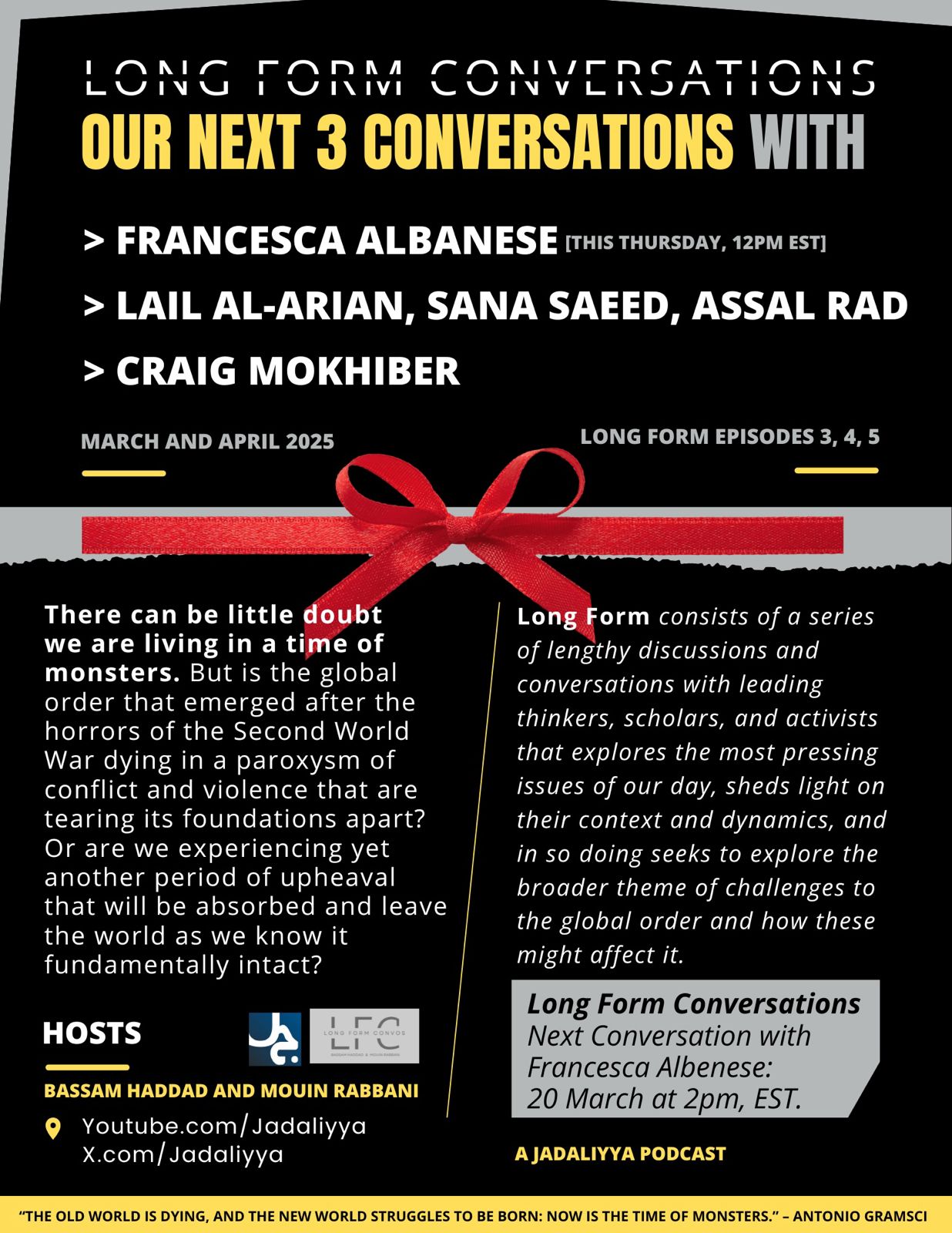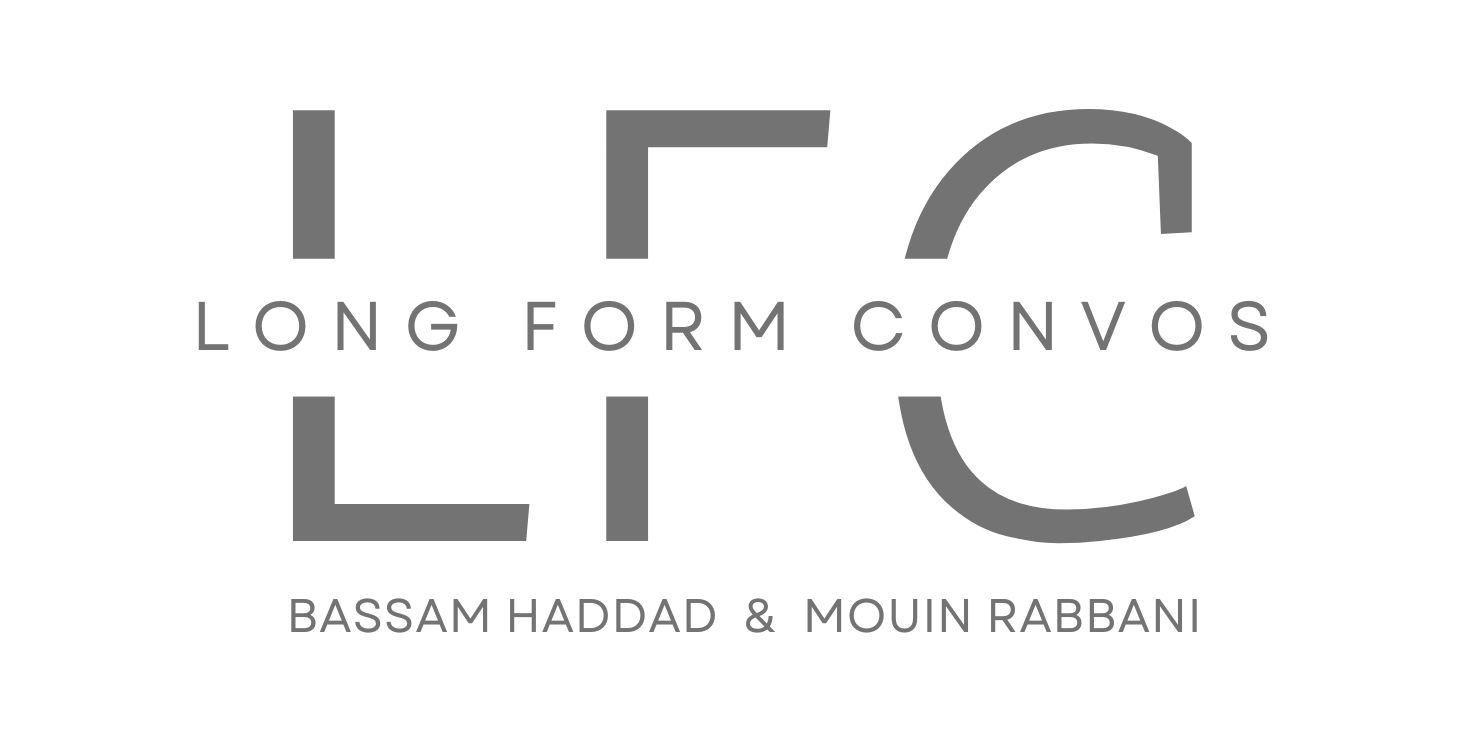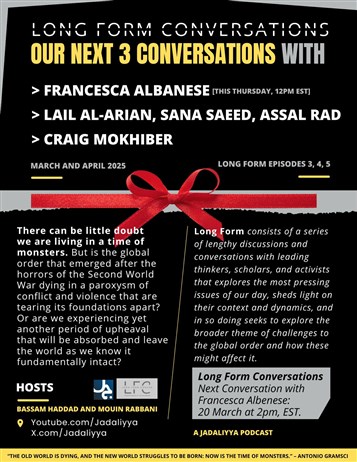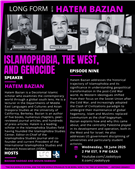Long Form Podcast
(Episodes 3, 4, & 5)
Upcoming Guests:
Francesca Albanese
Lail Al-Arian, Sana Saeed, Assal Rad
Craig Mokhaiber
Hosts:
Bassam Haddad
Sinan Antoon
Watch Here:
Youtube.com/Jadaliyya
X.com/Jadaliyya
There can be little doubt we are living in a time of monsters. But is the global order that emerged after the horrors of the Second World War dying in a paroxysm of conflict and violence that are tearing its foundations apart? Or are we experiencing yet another period of upheaval that will be absorbed and leave the world as we know it fundamentally intact?
Long Form consists of a series of lengthy discussions and conversations with leading thinkers, scholars, and activists that explores the most pressing issues of our day, sheds light on their context and dynamics, and in so doing seeks to explore the broader theme of challenges to the global order and how these might affect it.

Featuring
Francesca Albanese (Guest) is an affiliate researcher of Georgetown University and the American University of Beirut. She is the co-author, with Lex Takkenberg, of The Status of Palestinian Refugees in International Law: a Tale of Fragmentation and Opportunity, expected to be published by OUP in 2019. She worked as legal officer in the UNRWA Department of Legal Affairs and before, for OHCHR.
Laila Al-Arian (Guest) is a Washington DC-based journalist and the executive producer of Fault Lines, an award-winning current affairs program on Al Jazeera English. She has produced documentaries on subjects ranging from the Trump administration's Muslim ban to the impact of the heroin epidemic on children and an investigation into factory conditions producing garments for Walmart and Gap in Bangladesh. For her work, she has been honored with two News and Documentary Emmys, a George Polk Award, Peabody Award, a Robert F Kennedy Award in journalism, Overseas Press Club award and has been nominated for 19 News and Documentary Emmys. She is co-author of the book Collateral Damage: America's War Against Iraqi Civilians.
Sana Saeed (Guest) is a media critic, former correspondent at AJ+ and host of the series Backspace, and The Israeli Occupation Style Guide.
Assal Rad (Guest) is a scholar of Middle East history. She works on research and writing related to U.S. foreign policy issues, the Middle East, and contemporary Iran. Her writing can be seen in Newsweek, The National Interest, The Independent, Foreign Policy and more, and she has appeared as a commentator on BBC World, Al Jazeera, CNN, and NPR. She completed a PhD in History from the University of California, Irvine in 2018 and is the author of The State of Resistance: Politics, Culture, and Identity in Modern Iran (Cambridge University Press, 2022). Follow Assal on X/Twitter: @AssalRad
Craig Mokhiber (Guest) is an international human rights lawyer and former senior United Nations Official. He left the UN in October of 2023, penning a widely read letter that warned of genocide in Gaza, criticized the international response and called for a new approach to Palestine and Israel based on equality, human rights and international law. He has spent four decades in the international human rights movement, including more than thirty years at the United Nations. He is the former Director of the New York Office of the UN High Commissioner for Human Rights, held senior UN positions in Geneva, New York and in the field, and undertook human rights missions to dozens of countries across Africa, Asia, the Middle East, Eastern Europe and Latin America. He has served as the UN’s Senior Human Rights Advisor in Palestine, and in Afghanistan, led the team of human rights specialists attached to the High Level Mission on Darfur, headed the Rule of Law and Democracy Unit, and served as Chief of the Economic and Social Issues Section, and Chief of the Development and Economic and Social Issues Branch at OHCHR Headquarters. He was for five years the Chairman of the UN Task Force for Action Two (a global initiative to advance national human rights protection systems), and later Chaired the UN Democracy Fund consultative group, the UN Working Group on Leadership, and the UN Consultative Group on Inequalities, and the Steering Committee of the UN Human Rights Mainstreaming Fund.
Sinan Antoon (Host) is a poet, novelist, scholar and translator. He has published five novels and two collections of poetry. A third collection of poetry in English, entitled Postcards from the Underworld, was published by Seagull Books this past October. He has been described as one of the most acclaimed Arab novelists. His most recent work in Arabic is a novel entitled, Khuzama. His scholarly works include the book, Ibn al-Hajjaj and Sukhf: The Poetics of the Obscene in Pre-Modern Arabic Poetry. He is associate professor at New York University. He is co-founder and co-editor of Jadaliyya. His scholarly works include the book, Ibn al-Hajjaj and Sukhf: The Poetics of the Obscene in Pre-Modern Arabic Poetry. He is associate professor at New York University. He is co-founder and co-editor of Jadaliyya."
Bassam Haddad (Host) is Founding Director of the Middle East and Islamic Studies Program and Associate Professor at the Schar School of Policy and Government at George Mason University. He is the author of Business Networks in Syria: The Political Economy of Authoritarian Resilience (Stanford University Press, 2011) and co-editor of A Critical Political Economy of the Middle East (Stanford University Press, 2021). Bassam is Co-Founder/Editor of Jadaliyya Ezine and Executive Director of the Arab Studies Institute. He serves as Founding Editor of the Arab Studies Journal and the Knowledge Production Project. He is co-producer/director of the award-winning documentary film, About Baghdad, and director of the acclaimed series Arabs and Terrorism. Bassam is Executive Producer of Status Podcast Channel and Director of the Middle East Studies Pedagogy Initiative (MESPI). He received MESA's Jere L. Bacharach Service Award in 2017 for his service to the profession. Currently, Bassam is working on his second Syria book titled Understanding The Syrian Tragedy: Regime, Opposition, Outsiders (forthcoming, Stanford University Press).
Gaza in Context Collaborative Project
Co-Organizers: Arab Studies Institute, Georgetown University’s Center for Contemporary Arab Studies, George Mason University’s Middle East and Islamic Studies Program, Rutgers Center for Middle Eastern Studies, Birzeit University Museum, Harvard’s Center for Middle Eastern Studies, Brown University’s Center for Middle East Studies, University of Chicago’s Center for Contemporary Theory, Brown University’s New Directions in Palestinian Studies, Georgetown University’s Center for Muslim-Christian Understanding, Simon Fraser University’s Centre for Comparative Muslim Studies, Georgetown University-Qatar, American University of Cairo’s Alternative Policy Studies, Middle East Studies Association’s Global Academy, University of Chicago’s Center for Middle Eastern Studies, CUNY’s Middle East and Middle Eastern American Center, University of Illinois Chicago’s Arab american cultural Center, George Mason University’s AbuSulayman’s Center for Global Islamic Studies, University of Illinois Chicago’s Critical Middle East Studies Working Group, George Washington University’s Institute for Middle East Studies, Columbia University’s Center for Palestine Studies, New York University’s Hagop Kevorkian Center for Near Eastern Studies
“The old world is dying, and the new world struggles to be born: now is the time of monsters.” – Antonio Gramsci


\\ LONG FORM CONVERSATIONS //
There can be little doubt we are living in a time of monsters. But is the global order that emerged after the horrors of the Second World War dying in a paroxysm of conflict and violence that are tearing its foundations apart? Or are as we experiencing yet another period of upheaval that will be absorbed and leave the world as we know it fundamentally intact?
Long Form consists of a series of lengthy discussions and conversations with leading thinkers, scholars, and activists that explores the most pressing issues of our day, sheds light on their context and dynamics, and in so doing seeks to explore the broader theme of challenges to the global order and how these might affect it.

















